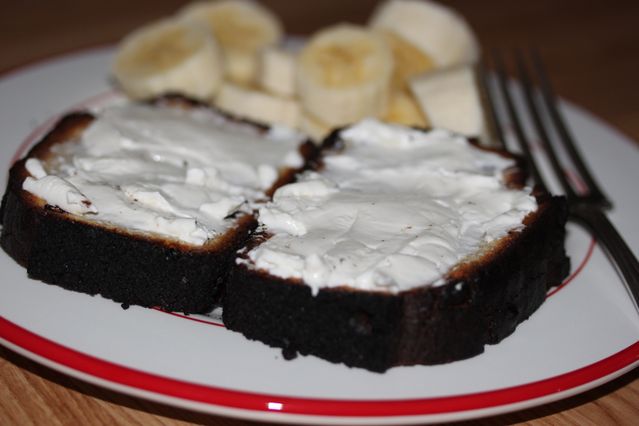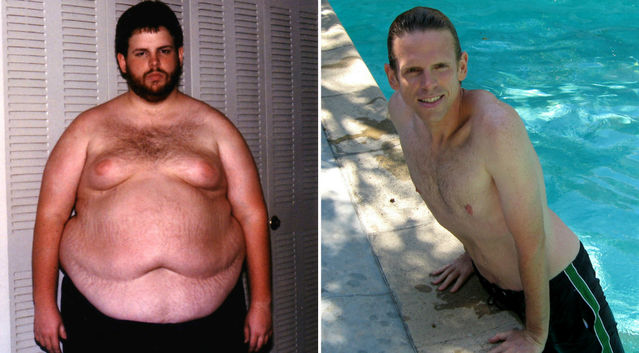Education
Can Us Dieters Really Have Our Cake and Eat it, too?
What offers more success? Cutting tempting foods out? Or learning moderation?
Posted November 21, 2015

Lately, there's been a common question that I seem to be asked over and over again: "Why aren't you a professional model?"
No, wait... That's not the common question.
The actual question is one that lots of people do ask me: "How do you eat decadent foods without gaining back any of the 250-plus pounds that you lost over a decade ago?"
The question comes as a result of me posting pictures of my freshly-baked bread creations and other occasional treats to the Just Stop Eating So Much! Facebook page—usually on weekends when I'm in the mood to explore my inner Martha Stewart. There's nothing like the smell of fresh-baked goodies wafting through the house. A recent baking endeavor resulted in a loaf of Sour-Cream-Blueberry Bread. And when enjoyed fresh out of the oven with (heaven forbid!) cream cheese, it makes for a wonderful treat that delights almost all the senses.
Did you catch the key word in the paragraph above? Treat.
Fresh-baked bread with cream cheese is not something I eat daily. Sometimes not even weekly. But it is something I enjoy in moderation. Even if I'm being strict with my eating plan (something that, for the record, I'm always paying close attention to, even when "treating" myself).
When working to get or to stay healthy, any food and drink requires portion control. This is as true for green beans as it is for fresh-baked breads. That's what moderation is all about. And whether you incorporate moderation into your lifestyle before, during or after a diet, it's something you're going to want to master at some point.
The reason I keep drilling the concept of moderation into your heads is because I'm constantly drilling it into my own. Believe me, I'm human. I get it. I want to take the whole loaf of fresh-baked Sour-Cream-Blueberry Bread, put it in a big bowl, add a vat of vanilla ice cream and find a big ol' spoon. But this is when I quickly remind myself that this is what 450-pound Gregg would do. Not 175-pound Gregg.
The differences build from there. 450-pound Gregg, while eating every last bite of the full loaf, the ice cream and whatever else could be used as a topping (an entire package of Oreo cookies, for example), would be telling himself that "this is the last time I'll ever eat this kind of food." 450-pound Gregg would devour every last bite—perhaps even while standing up or watching TV. (In other words, he wouldn't go to the trouble of putting out a placemat and making for a nice presentation and a relaxing eating experience—AKA he wouldn't be eating mindfully.)
450-pound Gregg would then be in great physical pain from eating so much all at once. And he'd likely repeat this same ritual ("last supper before starting the diet") the very next day—if not the very next meal.
Contrarily, 175-pound Gregg would let the bread cool, then immediately slice it up, based on reasonable serving sizes. In this case, he would cut about 12 slices into a nine-inch loaf. He would then go a step further, and put the unused portions into individual containers for future use. All without lapping up any crumbs. These containers with the separated portions would be saved in the fridge or even the freezer. And since the slices are stored in portion-sized containers, the temptation to overdo it would be greatly minimized—both now and in the future.
175-pound Gregg would place his current portion on a cute bistro-style plate and sit down and eat the reasonable portion (even with a small amount of low-fat cream cheese and with half of a banana, sliced up). 175-pound Gregg would enjoy this eating experience for all it's worth. Afterward, he would realize he's full and, more importantly, satisfied, and look forward to enjoying this treat again in the future. It should also be noted that 175-pound Gregg also got his butt to the gym before 5:00 a.m.—yes, even on a weekend morning—before he mixed up the batter and baked the bread.
I'm going to stop talking about myself in third person now because I don't want to be one of "those people." But hopefully you get the point. One person's routine vs. another's. Only, in actuality, it's the same person—with only about 250-plus excess pounds separating these two different ways of enjoying fresh baked bread.
Small differences? Maybe. But consistent differences? Totally. Differences that result in better thoughts, better digestion, a better body and better health. And that, my friends, is a recipe for something most delicious indeed.





